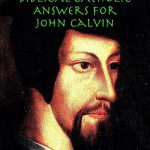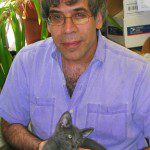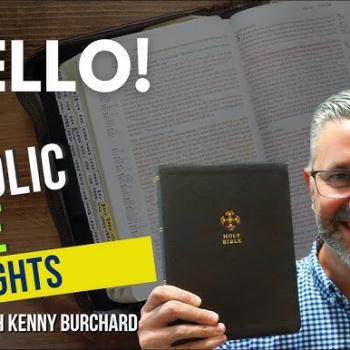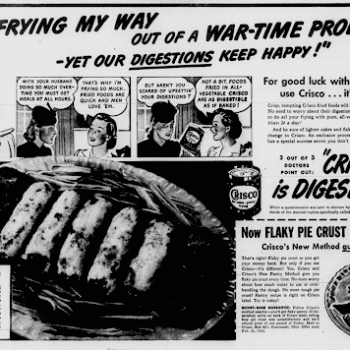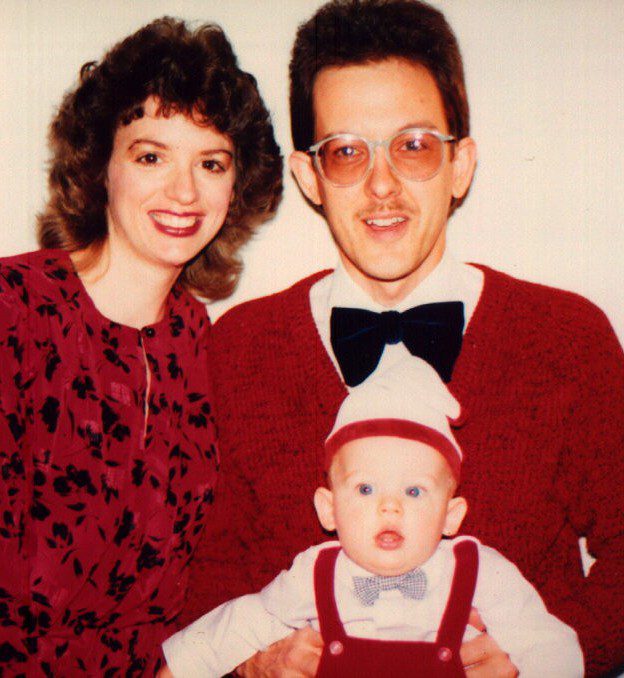
Dave and Judy Armstrong: December 1991: I was a father, a Catholic, and had a driving / delivery job (all new things in that year). My first published article (in The Catholic Answer) was just 13 months away. I had already written by this time my conversion story in Surprised by Truth and portions of my first book, A Biblical Defense of Catholicism.
***
(4-23-10)
***
Please visit Catholic Books and Gifts and purchase their products. You can see this interview on that website, too.
* * * * *
Initially it was exposure to C. S. Lewis in the late 70s that pushed me in that direction. I read Mere Christianity, The Problem of Pain, and The Screwtape Letters and enjoyed them all very much. I was in college at the time and concerned, as an evangelical Protestant, about being able to defend my faith in a rational manner, over against all the secularism that one gets in colleges these days. I wanted to integrate faith and reason; religion and rationality: to love God with my mind as well as my heart, soul, and strength (as our Lord Jesus Himself commanded us to do). But my Christian faith was still forming at that time: having been very secularized and indeed, almost nonexistent for the previous ten or so years.
The next phase was to become acquainted with the historical apologetics of Josh McDowell: his book, Evidence That Demands a Verdict. The name of my old website (1997-2007) and current blog is derived from that book: Biblical Evidence for Catholicism. I was also highly influenced by the Presbyterian apologist Francis Schaeffer in the early 80s. I started reading a lot, doing “Bible research” projects like studying the biblical rationale for the Trinity and deity of Christ, and also learning about heretical sects like the Jehovah’s Witnesses and doing outreach to them along with street witnessing: particularly at the Ann Arbor Art Fair all through the 80s.
Also, I got involved with Inter Varsity Christian Fellowship in college. From 1985 to 1989 I did campus outreach and evangelism at the University of Michigan, sponsored by my churches. So I was trying to cultivate a “thinking man’s evangelicalism” in those years. Once I became a Catholic in 1990, it was natural to progress right along to Catholic apologetics as well. I still do general Christian apologetics, but now I also defend the teachings of the Catholic Church, and especially try to show that they are as grounded in the Bible as any Protestant denomination.
2. What is the hardest part about apologetics? Easiest? The most satisfying? The most disappointing?
The hardest part (and most disappointing) is when you come up against a will or a mind that is immune to argument and reasoning: as with the fringe group of anti-Catholics or many atheists, and some other categories that I won’t name! I find that very difficult when I feel that a person has a closed mind because of the environment he is in. It’s immensely frustrating. I have seen many times the dynamic of the old saying: “a man convinced against his will retains his original beliefs still.” Of course, the Holy Spirit has to break down the will that is opposing the truth. But hopefully, He uses us apologists — weak vessels that we are — to help “remove roadblocks” and eliminate groundless objections.
The easiest part of it is doing what I love and showing how falsehoods are untrue. In other words, if the truth is on our side it is a lot easier to defend that than to defend opinions that are false in the first place. It’s like being an attorney with a terrible case to try to win: where the person truly seems guilty of the crime.
The most satisfying aspect of apologetics is to see people come into the fullness of the Catholic Church and to observe the joy and enthusiasm they have at that time and thereafter. I work part-time at The Coming Home Network, on their forum, and this Easter we had at least 30 people enter the Church. That’s why I do what I do. I wouldn’t want to be doing anything else. This is what God called me to do with my life. I want to do my part to help Catholics be happier, more fulfilled, and confident in what they believe, so that they can in turn effectively share their faith, and the “pearl of great price” with others. The harvest is ready . . .
3. What is the most common question you find yourself defending?
The basis of Catholic beliefs in the Bible (far and away), and especially the basis of Catholic authority (which gets into the areas of sola Scriptura — i.e., the Protestant notion of “Scripture Alone” as the only infallible authority — and the papacy and various aspects of Sacred Tradition). That’s convenient for me because that has always been my deliberate emphasis in my apostolate: showing the biblical rationale for Catholic beliefs. One can see that theme in my books. The Bible is the common ground that we share with our Protestant brethren, so if we wish to persuade them, we have to argue from that ground. They don’t accept what “some pope said 200 years ago.” That is not their authority. But if one makes a solid argument from the Bible, they have to grapple with that; they can’t casually dismiss it as what they see as “arbitrary authority.”
4. What advice would you give to a person who is struggling with accepting a tenet of their Catholic faith?
I would tell them first to pray about it: ask God to reveal to them that it is true (if indeed it is, and they already suspect that it is or they wouldn’t be struggling), since faith is not merely about reason. It is supernatural and a gift from God. Therefore, we have to exercise faith and pray. Secondly, I would direct them to resources (including my own) that can explain exactly what it is we believe as Catholics (catechetics) and how and why we believe it (apologetics). And I usually direct them to free information on the Internet. If they are mightily struggling with one particular thing, then I recommend books that I think can help them to reach certitude, in faith. I feel that solid answers can be given for anything to do with the Catholic faith: if not from my own body of work, then certainly from someone else: including the great saints and Doctors of the Church.
I think the Holy Father is being treated abominably. The sexual scandal is not his fault at all. He is probably doing more than anyone else in the Church to stop this horrific abuse from taking place. Yet he is the target. I think the enemies of the Church know full well who to attack if they want to minimize the impact of the Church. But it will backfire, as these attempts always do. It reminds me a lot of how Pope Pius XII is treated over the Holocaust issue. It is estimated that he was responsible for saving 800,000 Jews: a lot more than any secular group, for sure. Yet he is the one who is lied about and pilloried. It is a gross injustice. We need to defend our popes when they are innocent of these absurd charges.
The Church’s position on health care is exactly right, in my opinion. It is concerned for availability of health care to all; providing for the poor, but in a way that does not promote either abortion or socialism. The Church favors subsidiarity: things ought to be run on as local a level as possible, and truly helping all people, including the smallest and oldest and weakest among us. The Church, as so often, teaches and preaches a “third way” that is neither conservative nor liberal, in political terms.
6. What are you working on now?
I’ve been doing some writing on Calvinism, preparing some audio collections on themes (basically reading of Internet papers), and will soon be working on a revision of my book on sola Scriptura, for likely publication with a major Catholic publisher. In the next six months I’d also like to compile books on the biblical evidences for Catholic soteriology (theology of salvation) and Mariology.
7. What are your hobbies? What do you enjoy when not writing books?
I absolutely love the outdoors and travel. We are planning a family trip out west, which will be our third such trip in five years, and it is no small project, starting from southeast Michigan. We camp and take a lot of our own food, to save money, and avoid expensive museums! I’m a nature freak and also an avid music lover and collector (many kinds of music, including classical, and I can play about nine instruments). My third great non-theological love is sports. I still play softball, tennis, ping pong, pool, basketball, like swimming, and have taken up bowling recently. I once went hang gliding, and have been in gliders, small planes, and a helicopter. I also went whitewater rafting on one occasion. I have a daredevil aspect of my personality. I love good movies and documentaries (we watch TV as a family almost every night: strict quality control of what we watch!), and playing chess. I like group discussions and “heavy” dialogues (not just about theology). I love history and philosophy, and they often tie in with my work. And of course I love books of all sorts!
8. Who is your Confirmation Patron Saint, and why did you choose him/her?
It was a little different. I chose John Henry. By that I meant Blessed John Henry Cardinal Newman, because he was the biggest intellectual / theological influence on my conversion. I had read his Essay on the Development of Christian Doctrine, and that put me over the edge. Development remains one of my very favorite sub-topics in apologetics, but it is generally very difficult to discuss, since people often have a poor understanding of it, and confuse it with the heretical “evolution of dogma”.
9. What is your favorite book in the Bible? Verse? Biblical figure?
The book is probably John. I love Isaiah in the Old Testament: sweeping, majestic language. My favorite verse is Romans 8:28: “all things work together for good . . . ” That’s wonderful: a whole philosophy of life right there . . . And my favorite biblical figure (after our Lord and the Blessed Virgin Mary, I suppose) is the Apostle Paul. I love him, and I am constantly thinking about his reasoning and writings in doing apologetics. It is said that Paul could have been the greatest philosopher of his time if he weren’t an apostle. I think he is one of the most extraordinary thinkers who ever lived. He’s amazing.
10. Name a Catholic person you admire who provides a positive and inspiring model of our faith, and why.
St. Francis of Assisi. I immensely admire him because he was totally committed to God, and had such a beautiful approach to life: a gentleness and holiness and simplicity (of exactly the right sort) that is immediately striking and “draws one in.” That kind of complete dedication has always appealed to me, and I should be more than happy to attain one-tenth of the zeal that he had.
*****


